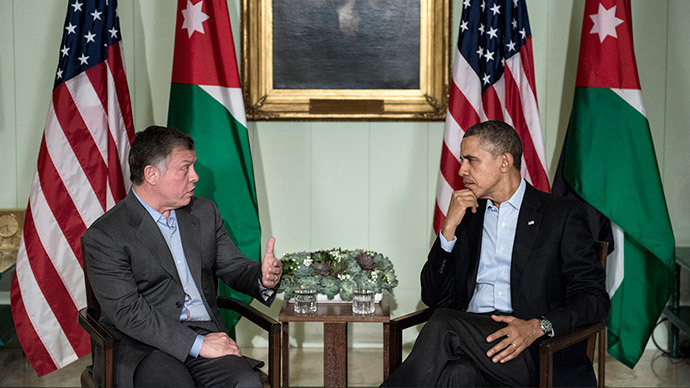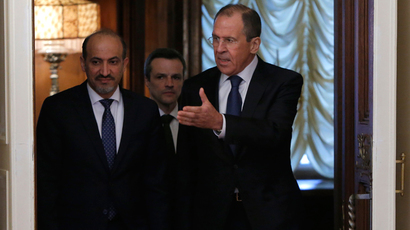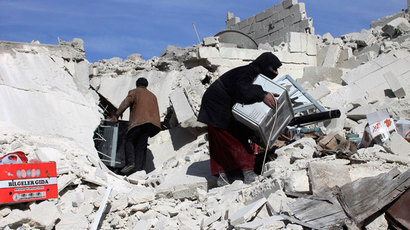Obama considers new steps against Syria ‘to pressure’ Assad

US President Barack Obama said he is mulling steps to put pressure on Syrian President Bashar Assad to kickstart the stalled Geneva peace conference. But Russia’s FM Sergey Lavrov says every attempt is being made to derail the peace process.
Obama’s comments were delivered while meeting with Jordan’s King Abdullah in California on Friday to discuss a range of issues, including the current Syrian stalemate.
The US president said he does not expect the conflict to be resolved in the immediate future, though “immediate steps” will be taken to “help the humanitarian assistance there.”
“There will be some intermediate steps that we can take applying more pressure to the Assad regime and we are going to be continuing to work with all the parties concerned to try to move forward on a diplomatic solution,” Reuters cited Obama as saying.
Obama did not specify what steps he would consider, but US Secretary of State John Kerry told reporters on Friday that Obama had asked “all of us to think about various options that may or may not exist."
Having pledged $1 billion in loans to help stabilize Jordan’s economy, the US believes that the country, which already currently has more than 600,000 Syrian war refugees, has a part to play in resolving the Syrian conflict.
“We have been ramping up our support to the moderate opposition and Jordan has its own strong role to play in relationship to the moderate opposition,” a senior Obama administration official told the agency following two hours of talks at the Sunnylands retreat.
Frustrated by what he views as Assad’s intransigence regarding a transition of power in the country, Obama has made it a clear a more assertive policy could be in the works.
Senior administration officials who briefed reporters about Obama’s talks with King Abdullah reiterated previous claims that all options remain on the table, short of putting boots on the ground.
One option is arming the Syrian rebels, something that Washington’s Gulf allies have been actively doing, though one official said such a move would only be enacted to help push the process toward a political solution.

According to one report last month, the US Congress has already authorized sending small arms, an assorted variety of rockets, and financial backing to moderate rebel forces.
American and European security officials told Reuters that the US will provide anti-tank rockets, but nothing as deadly as shoulder-launched surface-to-air missiles (known as MANPADs), which can be used to bring down military or civilian aircraft.
The US has long opposed arming rebels with anti-aircraft missiles, fearing they could fall into the hands of extremists who would then use them against the West or commercial airlines. A senior Obama administration official told the Wall Street Journal on Friday that the US objection remains the same. "There hasn't been a change internally on our view," the official said.
Meanwhile, Saudi Arabia on Friday decided to start providing the opposition with Chinese Manpads and antitank guided missiles from Russia, WSJ reports, citing Western and Arab diplomats and opposition figures.
Although significant military hardware remains off the table for now, the US for its part has increased its financial support to the opposition, handing over millions of dollars to help pay rebel fighters, said rebel commanders who received some of the money. Washington would not comment on the payments.
‘Thwarting peace in Syria’
On Friday, FM Lavrov said it was his impression that “systematic attempts” were being made to find any excuse to derail a political settlement in Syria.
“First, a political settlement was almost derailed over speculation regarding chemical weapons. Now that that problem is solved, I hope that everything will be done, just as the Syrian leadership has pledged,” Lavrov told a press conference following talks with his German counterpart, Frank-Walter Steinmeier.
‘When the chemical [weapons] issue is not being speculated over, then attempts are made to politicize the issue of the humanitarian crisis,” he said.
Lavrov said that when Russia and the US took the initiative to push ahead with the Geneva 2 peace conference, it was perfectly clear that there should be complete implementation of the June 2012 Geneva Communique, which, among other points, calls for a transitional governing body that could include members of the current government and the opposition.
But in pushing the Syrian opposition to participate in the Geneva 2 conference, there is now the impression that Western powers only did so for the sake of initiating regime change, he said.
“Certainly, we grow alarmed whenever the presidents of the United States and France once again say at a joint press conferences that the affair may go beyond negotiations," Lavrov said.














